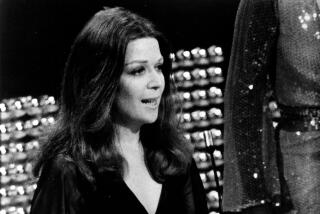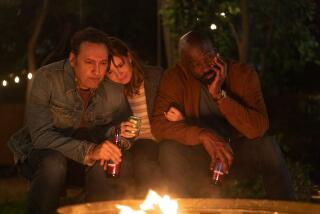The Contenders: Tina Fey gets to let loose on the ‘fun stuff’ in ’30 Rock’s’ final season
Tina Fey never had a master plan for the end of “30 Rock.” She wasn’t even sure if, this time last year, NBC Chairman Robert Greenblatt was about to pick up the phone, cancel the show and preempt a graceful exit for her decorated sitcom.
“We’ll never really know,” Fey says with a laugh. “I know on our end we were ready to finish our stories. We wanted one last season to wrap it up, get out at the right time and feel good about it.”
“30 Rock” ended its seven-year run with a 13-episode season that culminated with a bittersweet series finale that tied up the saga of the “TGS” family in a way that stayed true to its funny, flermy core. We talked to Fey about crafting the show’s farewell, balancing its tone, and Kenneth the page’s strange powers.
’30 Rock’s’ Tina Fey and others on their favorite episodes
Was a 13-episode final season always the plan?
We felt we could really control the arc of the story with 13. So it was a request we made to Bob [Greenblatt], and he said yes so immediately that I can’t help but think he was pleased he didn’t have to pay for 22 of them.
Did you find the shorter season creatively invigorating?
It was exciting. Things could finally happen! With episodic comedy, you spend a long time wanting the characters to grow — but not too much. So now we could do a bunch of big things.
Like Liz and Jack winding up in bed together, albeit fully clothed.
More than fully! In that moment, I wanted Liz and Jack to finally, openly discuss, “Well, why didn’t this ever happen?” It’s the kind of fun stuff you can do on your way out that you can’t on Season 4.
TIMELINE: Emmy winners through the years
Series finale episodes are hit and miss. Did you have a model for what you wanted to do with “30 Rock”?
“The Mary Tyler Moore Show” is a classic. The “Cheers” finale was good, but I didn’t remember it was two hours. It was farther-reaching than I remembered.
Did you watch it again?
We watched a lot of series finales. Every day at lunch we’d watch one. And then as it got closer to our series ending, our reaction to these would get increasingly emotional. The turning point came when one of our writers, Tracey Wigfield, started crying as Frasier wheeled Martin’s recliner out of the room. “Uh-oh! Here it comes!” That was a really good series finale, by the way. And “iCarly.” I kept telling everyone to watch that.
What lessons did you learn from your finale marathon?
That it’s OK to give the actual characters little moments to say goodbye to each other. That’s why we felt like “The Girlie Show” should also be ending, so it would build in them getting to part company with each other on-screen.
And you had those emotional moments and yet it was funny too, very much keeping with the tone of the series.
That was important. I remember watching the “MASH” finale as a kid and thinking, “Wow. That was a real tonal departure!” That “MASH” finale was sad!
Did you always have particular places you wanted characters to end up?
I wanted Liz to marry and adopt the kids but keep working. For Jack, we had been clinging to the idea that he’d become mayor of New York. But the series ending didn’t time with the election, and so we walked away from that.
THE ENVELOPE: The awards insider
Kenneth running NBC seems a hopeful comment on television’s future.
It’s very hopeful. Kenneth’s love for television and belief that it’s a good thing and brings joy to people really does reflect the way we on the staff feel. We all grew up in the ‘70s watching shows like “MASH” and the Norman Lear shows when television was the place where great stuff happened.
Jenna singing “Rural Juror” over the closing montage felt like your show’s version of Bette Midler singing “One for My Baby” to Johnny Carson.
We wanted Jane [Krakowski] to sing one more time, and why not enjoy the wonderful manipulative device of singing a lovely song over our last 30 seconds. But it had to be one of our weird songs, since we’ve always had a thread of jokes about how music can manipulate you even when it’s meaningless.
And then you cut to the “St. Elsewhere” moment where, many years into the future, an ageless Kenneth looks into a snow globe. He’s still president of NBC and Liz’s great-granddaughter is pitching him a “30 Rock”-style show.
We always knew Kenneth is immortal, right? And I liked the notion that everyone in the future is multiracial, but Liz’s children in particular because ... well, we don’t know which of her adopted children is the grandparent of that child. But we will find out in the “30 Rock” young adult book series!
More to Read
From the Oscars to the Emmys.
Get the Envelope newsletter for exclusive awards season coverage, behind-the-scenes stories from the Envelope podcast and columnist Glenn Whipp’s must-read analysis.
You may occasionally receive promotional content from the Los Angeles Times.









